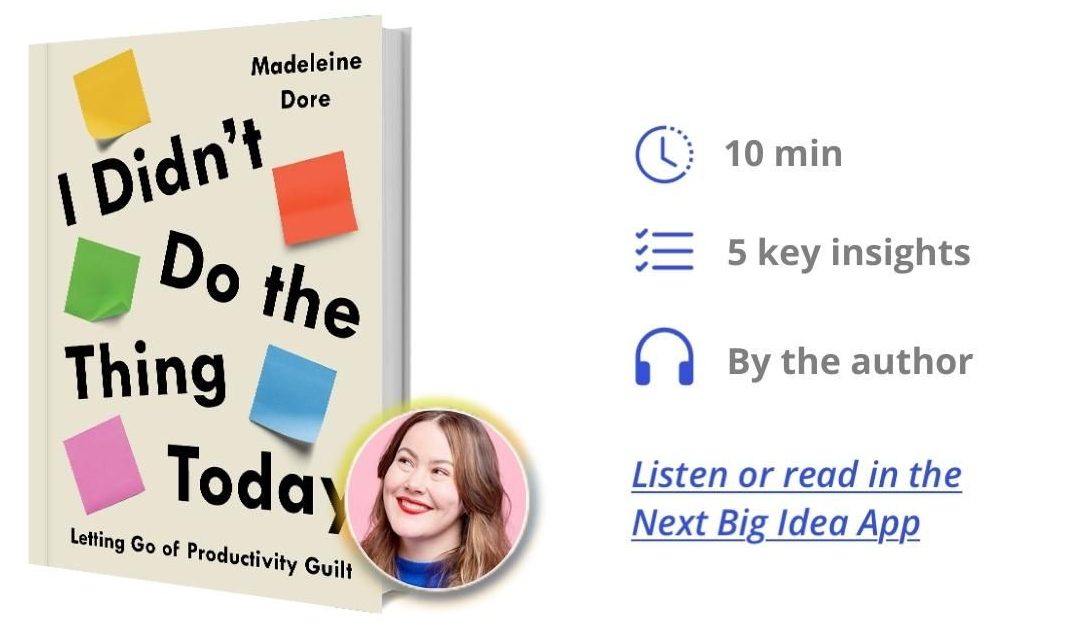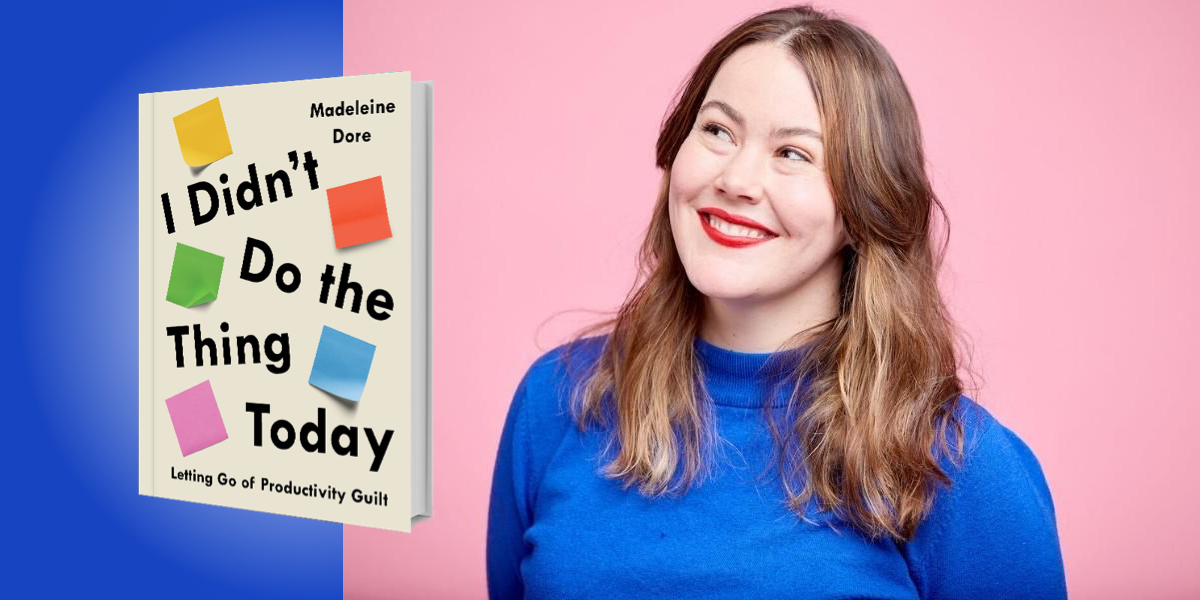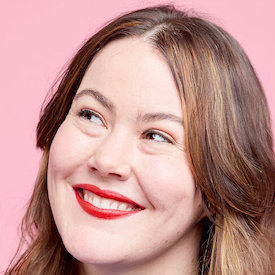Madeleine Dore runs a popular blog, Extraordinary Routines, and hosts a podcast, Routines & Ruts. Through these platforms and by regularly conducting life experiments, Dore investigates how to live creatively and broaden the definition of a day well spent.
Below, Madeline shares 5 key insights from her new book, I Didn’t Do the Thing Today: Letting Go of Productivity Guilt. Listen to the audio version—read by Madeline herself—in the Next Big Idea App.

1. Take productivity off its pedestal.
Maybe you didn’t do the thing today because productivity is too narrow a lens for our days.
There’s nothing inherently wrong with being productive—we all need to get things done—but when we conflate productivity with self-worth, we never measure up. Rather than making us better, this “doing obsession” may leave us overwhelmed, burnt out, dissatisfied, inadequate, and alone.
Productivity tells us to live sequentially, but our days rarely unfold in perfect order. Not only does each day vary, but we vary within them. We are constantly shifting, creating and re-creating ourselves.
If productivity narrows our days, creativity expands them. Creativity doesn’t follow a plan, but has its own ebb and flow. Instead of confining a day to doing, it enlivens us to the many ways we can do differently. Creativity is a vibrant, expansive, rewarding measure of our days compared to the rigidity of productivity.
You don’t need to be “a creative” to live a creative life. We all have access to this innately human trait. It’s present in the ways we get to know ourselves, express ourselves, question what we believe, and discover what we want—it’s in how we live our lives.
2. The surest way to squander time is to worry about wasting it.
Maybe you didn’t do the thing today because the thing simply wasn’t ready yet.
“The time we enjoyed ‘wasting’ is not wasted time at all.”
We are imperfect and bound to waste time: we put things off, become distracted, chit-chat too long with colleagues. But we also judge how we spend our time rather harshly. We’re quick to label preparation as procrastination, and easily overlook that things take the time they take. Some days, we may only spend an hour doing the thing, but it can take all day to set ourselves up for that one potent hour. The time we spend thinking about doing the work can be a necessary part of doing it.
Perhaps we need to shift away from trying to maximize our time and, instead, try to reduce our worry about wasting it. We don’t have to view every moment we don’t spend the way we expected to as a waste—we can simply appreciate the part it played in our life.
One approach to reduce wasted-time worry is to remember that time cannot be wasted in advance—a sentiment I’ve borrowed from Arnold Bennett, who says that you can turn over a new leaf every hour if you choose. So, you’ve spent a few hours worrying rather than beginning something? Turn over a new leaf. You got stuck in traffic and are late to an event? Turn over a new leaf. You slept through your alarm? Turn over a new leaf. Perhaps we’d also do well to remember that the time we enjoyed “wasting” is not wasted time at all.
3. There is no such thing as the right decision.
Maybe you didn’t do the thing today because you were caught in the standstill of indecision.
Sometimes, we can become stifled because we don’t know whether we are making the right call, or we are forever comparing choices. It’s easily overlooked that our indecision is a decision that keeps us suspended, stuck in limbo, and sometimes opportunities pass us by.
“We don’t know where our decisions will lead, because we can only connect the dots once we’re looking back.”
Perhaps the best advice when facing indecision is to recognize that we can make a choice, and it doesn’t have to be the right one—because there is no such thing. We don’t know where our decisions will lead, because we can only connect the dots once we’re looking back. And even then, it’s only the faintest of outlines of our prior decisions. Whether it’s romance, friendships, career paths, or new interests, we never saw most of the things that give our lives meaning coming. As I remember hearing from a 90-year-old woman, “You can’t arrange life; it happens around you.”
4. We are more likely to do the thing if we enjoy doing it.
Maybe you didn’t do the thing today because you simply didn’t want to.
Maybe it was too difficult. Maybe it was too daunting. Maybe it was too dull. With dread as the starting point, no wonder we put something off. But luckily, the antidote is delightful discipline—putting fascination, curiosity, and enjoyment in place of punishing rules.
After all, we’re far more likely to find motivation and sustain momentum if we enjoy something. Even for difficult things, we can find a way to enjoy them—make them easier, smaller, and fun.
For instance, use the “Eat the Clotted Cream” method. It’s a spin on the “Eat the Frog” method popularized by author Brian Tracy, which suggests doing our most dreaded task first to get it out of the way. It’s a great approach for a productive day, but beginning our day with dread can make it hard to get out of bed. So, my Eat the Clotted Cream idea is all about putting the highlight and delight first. It was inspired by my conversation with a farmer who started his day with a dollop of clotted cream on his porridge. Your clotted cream can be anything—a delicious breakfast, a walk, a moment of solitude. The point is that if we begin by feeling the day can’t get any better than this, then we’ll likely bring a mood that proves it can.
“If we begin by feeling the day can’t get any better than this, then we’ll likely bring a mood that proves it can.”
5. Learning is the only thing that never fails.
Maybe you didn’t do the thing today because life got in the way.
Our days won’t always go according to plan—in fact, they rarely do. We face disappointments, heartbreaks, hardships, and loss. As challenging as these difficulties may be, we wouldn’t want our days to be friction-free. It’s in tensions, problems, and mistakes that we learn; it’s one of the most important things about being alive.
Finding something to be curious about can bring shimmer back to our days. As the novelist T. H. White wrote, “The best thing for being sad is to learn something. That’s the only thing that never fails.” The wonderful thing about learning is that it expands—interest begets interest—and it doesn’t have to cost us a thing. We can learn from conversations, the problems we need to solve, the risks we take, growing older, rejection, and from discovery.
Curiosity is how we find the extraordinary in the ordinary. We want to rid the mundane from our days by multitasking, outsourcing, or turning to life hacks. But if we are curious about the ordinary moments, if we tend to them, if we get the good out of every bit…what a life we will have created.
To listen to the audio version read by author Madeline Dore, download the Next Big Idea App today:
































